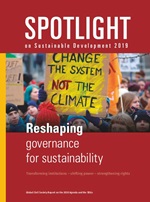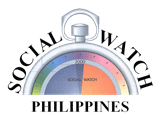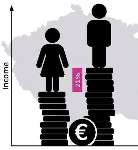Social Watch News
Published on Thu, 2020-03-19 23:59
Cyprus undergoes a trade-off between urgent responses to the economic and financial crisis and its sustainable development commitments. As a member of the European Union, Cyprus should be implementing the concepts of Policy Coherence for Development (PCD) and Policy Coherence for Sustainable Development (PCSD), yet neither of these is mentioned in the country’s official Voluntary National Review, which in fact omits the whole of SDG 17 (on implementation).
|
Published on Thu, 2020-03-19 23:45
 |
SDG 6, Ensure availability and sustainable management of water and sanitation for all, represents one of the easiest – and most fundamental – parts of the 2030 Agenda to achieve. Dynamics of power and inequality shape access to water, sanitation and hygiene (WASH) and other basic services, both in terms of tangible metrics (income, nearness and type of family toilet or water source) and because of the unequal distribution of influence over decision-making - the gulf between whose rights and voices count and whose do not. Raising the political leverage of communities facing discrimination in infrastructure and service provision is key in changing the power relationships between users and providers. The preconditions for universal access to WASH at national level must be matched by commitments at international level: to significantly increase official development assistance (ODA), restructure debt, curb illicit financial flows and stimulate new sources of international public assistance through democratic institutions.
|
Published on Thu, 2020-03-19 22:03
Social Watch Philippines, together with a number of Filipino academics and civil society representatives, present a policy matrix that identifies urgent issues, provides analyses and outlines recommendations on trade and development from a wide range of actors from civil society, the academe, and private sector in time for the preparatory process leading to the UNCTAD XV Conference to be held in Barbados from 18 to 23 October 2020.
|
Published on Thu, 2020-03-19 18:32
Ollivier de Sutter, former Special Rapporteur of the United Nations on the Right to Food (2008 to 2014) was voted by the Human Rights Council in its March 13 session as Special Rapporteur on Human Rights and Extreme Poverty, from May 1 on.
Commenting on his appointment, De Sutter wrote: “Ironic turn of history: in May 2008, I inaugurated my mandate as Special Rapporteur on the right to food in a context of unprecedented crisis, with an explosion in food prices linked both to a barrel of oil at the highest and speculation on the markets, as well as restrictions on exports of food products ... Twelve years later, this new appointment comes at a time when a major economic recession is coming, with business closings chain, massive job losses, and an increase in poverty in the face of exhausted social protection systems.
|
Published on Thu, 2020-03-19 16:18
An initial assessment of the impact of COVID-19 on the global world of work says the effects will be far-reaching, pushing millions of people into unemployment, underemployment and working poverty, and proposes measures for a decisive, co-ordinated and immediate response.
|
|
Published on Tue, 2020-03-03 18:31
|
Published on Thu, 2020-02-27 11:26
Input from the Civil Society Financing for Development Group in response to the announcement by the Presidents of the UN Economic and Social Council and the UN General Assembly, regarding the establishment of a High-level Panel on International Financial Accountability, Integrity and Transparency for Achieving the 2030 Agenda.
|
|
Source: 
. Published on Wed, 2020-02-26 00:00
El mensaje no pudo haber sido más claro: “Nos enfrentamos a la amenaza muy real de una pandemia fulminante, sumamente mortífera, provocada por un patógeno respiratorio que podría matar de 50 a 80 millones de personas y liquidar casi 5% de la economía mundial. Una pandemia mundial de esa escala sería una catástrofe y desencadenaría caos, inestabilidad e inseguridad generalizadas”.
|
Published on Tue, 2020-02-25 10:05
The Czech Republic has enjoyed steady economic growth, low inflation and low unemployment in recent years. Income inequality (Gini coefficient 0.25) is the third lowest among OECD countries. In 2018 the proportion of citizens at risk of income poverty (relative poverty - with an income of 60% or less of the national median) were about 10% of the population, while those in absolute poverty (‘materially deprived’) were 8% of the population. Older citizens (65+ years) are worse off than other age groups. In 2018, 10% of households with children (30% of which were single- adult households - single mother or single father) found themselves in income poverty. Furthermore, Czechia has one of the highest proportions of homeless people in the European Union (0.65 % of the population).
|
Published on Tue, 2020-02-25 09:49
The potential of partnerships with the private sector dominated the narrative characterizing the initial phase of implementation of the 2030 Agenda for Sustainable Development. In relation to SDG 2, a prominent multi-stakeholder platform is the Scaling Up Nutrition ‘Movement’. Laura Michéle and Kavya Chowdhry (FIAN International), Patti Rundall (IBFAN) and Stefano Prato (SID) explain that as documented by a multi-country study, this case exposes how interventions promoted by MSPs often do not address the social, cultural, economic and political determinants of malnutrition and rather emphasize short-term, technical interventions, owing to private sector influence in the context of a consensus driven process.
|
SUSCRIBE TO OUR NEWSLETTER
Submit

|










